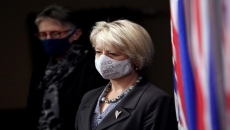Canadian researchers say children may be less infectious than adults with the COVID-19 virus, suggesting daycares, schools and extracurricular activities could continue with appropriate precautions in place.
Lead investigator Dr. Jared Bullard, an associate professor of pediatrics and infectious diseases at the University of Manitoba, says the findings suggest child care workers, teachers and support staff may be at lower risk of becoming infected.
The research published Friday in the Canadian Medical Association Journal involved 175 children and 130 adults in Manitoba infected with SARS-CoV-2 to see if there was a difference in infectiousness between the two groups.
Cell cultures of swabs from the back of the nose and throat were obtained from children and adults who tested positive for the virus and from their contacts who were also infected between March and December 2020.
Of the total samples used to investigate viral loads, 97 were collected from children aged 10 or younger, 78 were from those between the ages of 11 and 17 and 130 were from adults.
Results showed that compared with adults, children were less likely to grow virus in culture and had lower viral concentrations, suggesting they are not the main drivers of transmission.
"Our findings have important public health and clinical implications," Bullard says in a statement.
"As an increasing number of jurisdictions consider whether in-school learning, daycares and extracurricular activities should continue or resume, a better understanding of the relative contributions of children and adolescents to SARS-CoV-2 transmission, when compared with adults, is essential," the authors say.
"This is particularly important given the increased likelihood of asymptomatic infection in this group."
Given the difficulties in keeping children isolated at home and the significant impact of prolonged isolation on both child development and parents who may lose employment or income, a robust tool to decrease the length or need for quarantine would be an important public health development, they say in the study.






